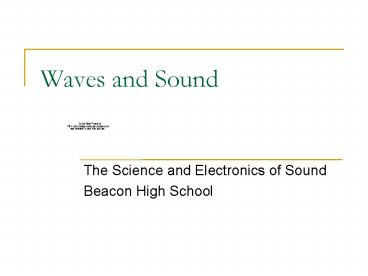Waves and Sound - PowerPoint PPT Presentation
1 / 14
Title:
Waves and Sound
Description:
Waves and Sound The Science and Electronics of Sound Beacon High School What is a wave A WAVE is a vibration or disturbance in space. A MEDIUM is the substance that ... – PowerPoint PPT presentation
Number of Views:73
Avg rating:3.0/5.0
Title: Waves and Sound
1
Waves and Sound
- The Science and Electronics of Sound
- Beacon High School
2
What is a wave
- A WAVE is a vibration or disturbance in space.
A MEDIUM is the substance that all SOUND WAVES
travel through and need to have in order to move.
3
Two types of Waves
- The first type of wave is called Longitudinal.
Longitudinal Wave - A fixed point will move
parallel with the wave motion
2 areas Compression- an area of high molecular
density and pressure Rarefaction - an area of low
molecular density and pressure
4
Two types of Waves
The second type of wave is called Transverse.
Transverse Wave - A fixed point will move
perpendicular with the wave motion.
Wave parts(recall demo for simple harmonic motion
)- crest, trough, wavelength, amplitude,
frequency, period
5
Wave Speed
You can find the speed of a wave by multiplying
the waves wavelength in meters by the frequency
(cycles per second). Since a cycle is not a
standard unit this gives you meters/second.
6
Example
- A wave is traveling along a rope. It is observed
that the wave completes 40.0 vibrations in 30.0
s. Also, a given crest travels 425 cm along a
rope in 10.0 s . What is the wavelength?
7
Example
- A wave is traveling along a rope. It is observed
that the wave completes 40.0 vibrations in 30.0
s. Also, a given crest travels 425 cm along a
rope in 10.0 s . What is the wavelength?
8
Example
- A wave is traveling along a rope. It is observed
that the wave completes 40.0 vibrations in 30.0
s. Also, a given crest travels 425 cm along a
rope in 10.0 s . What is the wavelength?
1.33 Hz
9
Example
- A wave is traveling along a rope. It is observed
that the wave completes 40.0 vibrations in 30.0
s. Also, a given crest travels 425 cm along a
rope in 10.0 s . What is the wavelength?
1.33 Hz
0.425 m/s
0.319 m
10
Example
- A wave is traveling along a rope. It is observed
that the wave completes 40.0 vibrations in 30.0
s. Also, a given crest travels 425 cm along a
rope in 10.0 s . What is the wavelength?
1.33 Hz
0.425 m/s
0.319 m
11
Natural Frequency
- A natural frequency is a frequency which an
object vibrates at most efficiently. - Most vibrating objects have numerous natural
frequencies. This gives them their unique sound
or timbre - The lowest natural frequency is called the
fundamental frequency and any integer multiple is
called a harmonic or overtone. Ex. A fundamental
frequency200Hz, therefore 600Hz would be a
harmonic)
12
Standing Waves
- A standing wave is a pattern that results from
the interference of a wave and a reflected wave
of the same frequency and amplitude. There are
two main parts to a standing wave - Antinodes Areas of MAXIMUM AMPLITUDE
- Nodes Areas of ZERO AMPLITUDE.
Link to animations of standing waves
13
Resonance
- Sound Waves are a common type of standing wave as
they are caused by RESONANCE. - Resonance when the frequency of one vibrating
object matches a natural frequency of another
object, producing vibration, sound, or even
damage.
One example of this involves shattering a wine
glass by hitting a musical note that is on the
same frequency as the natural frequency of the
glass. (Natural frequency depends on the size,
shape, and composition of the object in
question.) Because the frequencies resonate, or
are in sync with one another, maximum energy
transfer is possible.
14
Sound Waves
- The production of sound involves setting up a
wave in air. To set up a CONTINUOUS sound you
will need to set a standing wave pattern. - Three LARGE CLASSES of instruments
- Stringed - standing wave is set up in a tightly
stretched string - Percussion - standing wave is produced by the
vibration of solid objects - Wind - standing wave is set up in a column of air
that is either OPEN or CLOSED - Factors that influence the speed of sound are
density of solids or liquid, and TEMPERATURE































